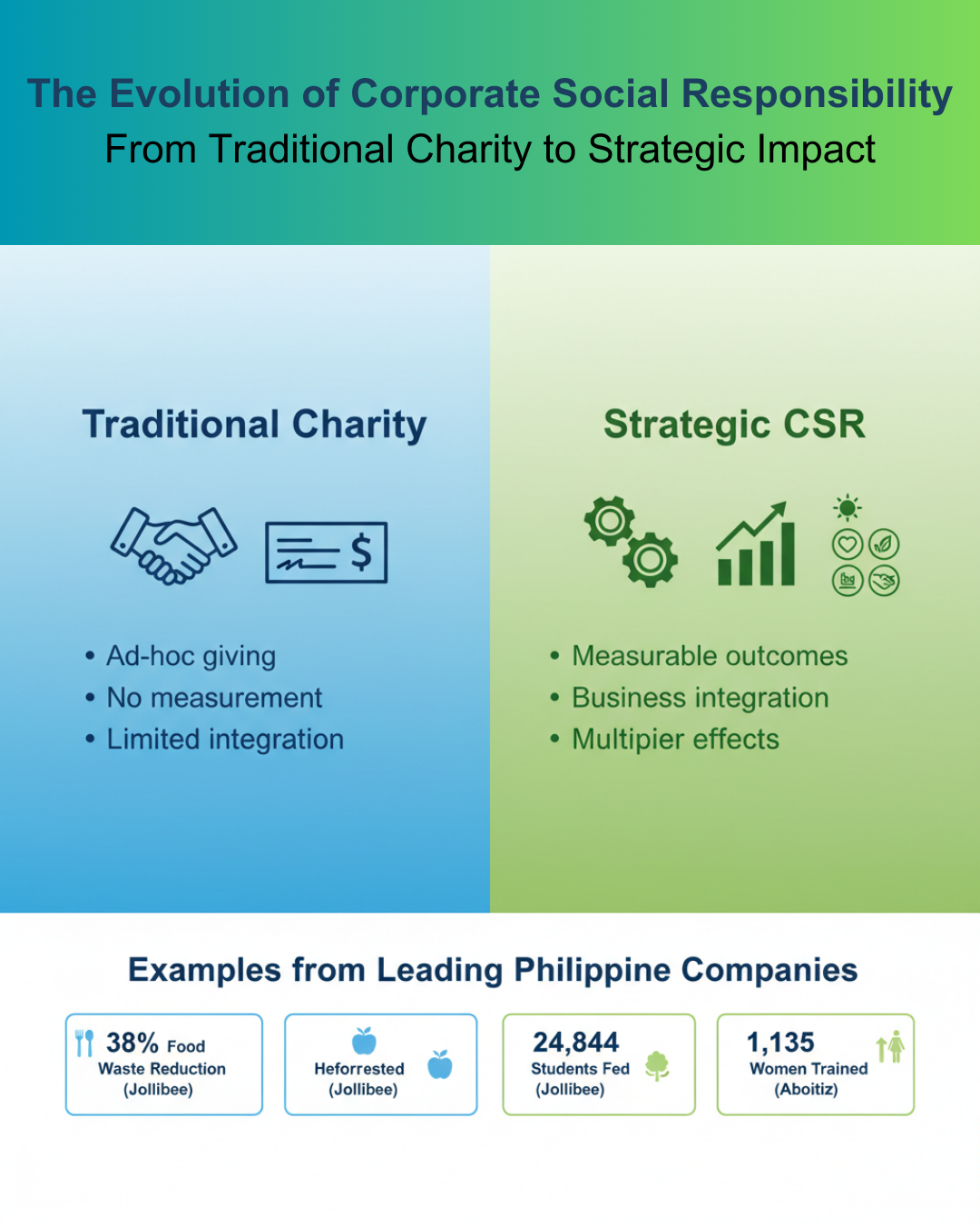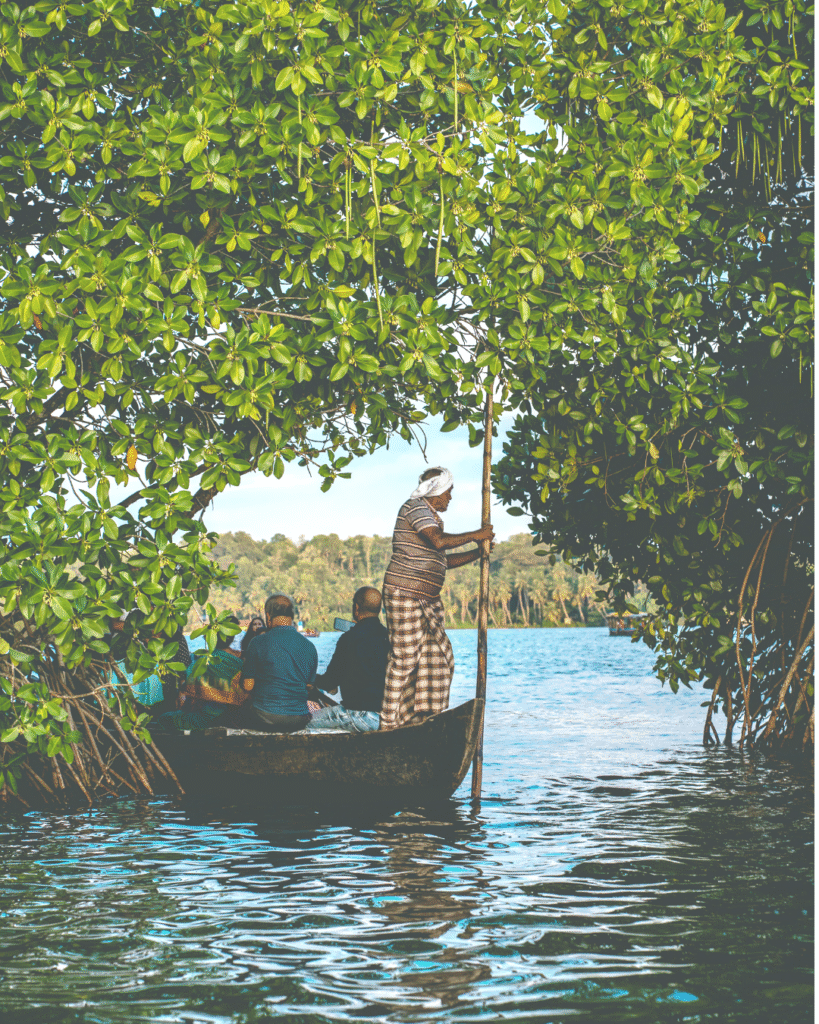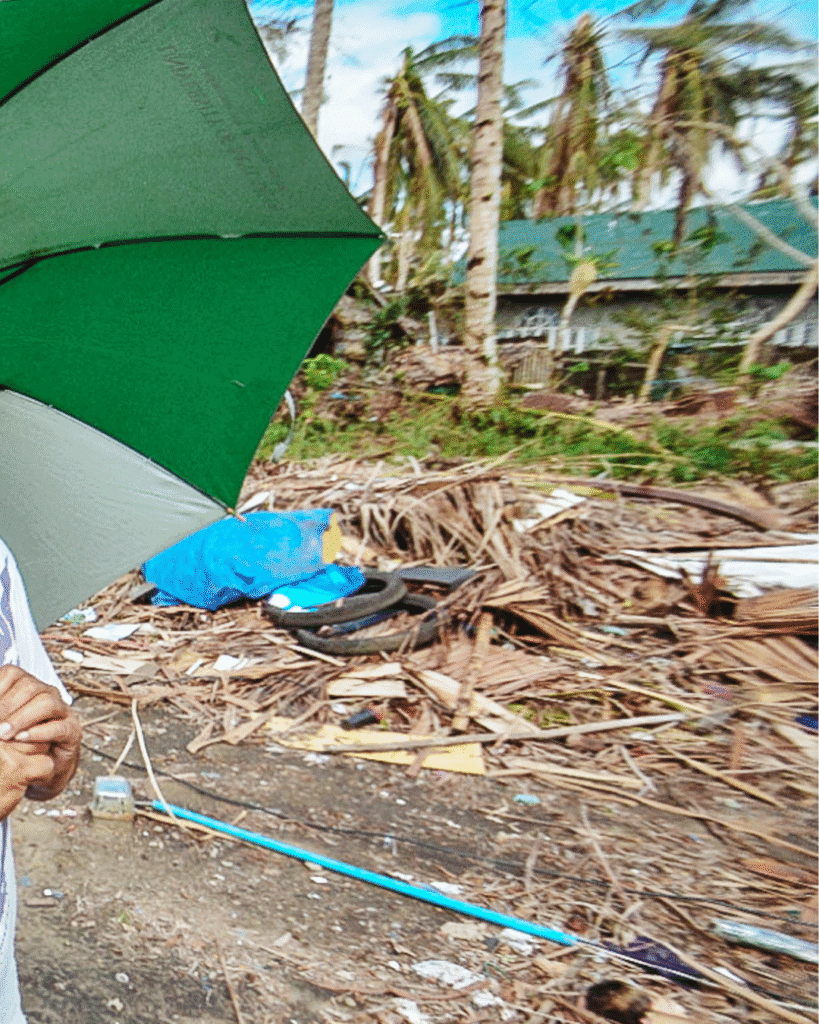Corporate social responsibility in the Philippines has evolved beyond traditional charity. Leading companies now embed purpose into their core operations, creating measurable impact that advances both business objectives and the United Nations’ Sustainable Development Goals.
Where once CSR meant annual donations or one-off community events, Philippine corporations are implementing comprehensive programs that address systemic social challenges while strengthening their own operations. This shift reflects a deeper understanding that sustainable business success requires healthy communities and environments.
The change is visible across industries—from food service to banking to retail—as companies discover that their core competencies can drive social progress while delivering business value.

Measuring What Matters
Jollibee Group’s “Joy for Tomorrow” sustainability agenda achieved a 38% reduction in food loss and waste at manufacturing sites while avoiding 5,589 metric tons of greenhouse gas emissions. The company installed over 16,800 solar panels generating 9.1 megawatts of clean energy, showing how environmental initiatives can reduce operational costs while building community resilience.
Their Busog, Lusog, Talino school feeding program served 24,844 pupils across 250 schools in 2024. The program leverages Jollibee’s expertise in food service and logistics to address hunger, health, and education simultaneously—proving that companies can apply their core strengths to create lasting social change.
BDO Foundation demonstrates how financial institutions can leverage their expertise for social impact. Through targeted socio-economic upliftment programs, BDO addresses the needs of marginalized sectors with particular focus on disaster-affected families and sustainable livelihood development. Their approach recognizes that financial inclusion creates cascading benefits—when families rebuild economic stability, entire communities grow stronger.

The foundation’s accreditation for good governance underscores their commitment to transparency and accountability, transferring banking sector standards to social programs. This approach extends to their healthcare outreach initiatives, which address immediate medical needs while building long-term wellness infrastructure in underserved areas.
SM Foundation’s comprehensive model spans education, healthcare, housing, and disaster response. Their disaster response capabilities, built on SM’s extensive retail network and logistics infrastructure, transform commercial assets into humanitarian resources. During emergencies, SM stores become distribution hubs, demonstrating how retail infrastructure can serve broader social purposes.
Their education and housing programs create stable foundations for community development. By addressing multiple aspects of poverty simultaneously, SM Foundation recognizes that sustainable progress requires integrated solutions rather than isolated interventions.


Innovation through partnership
Aboitiz Foundation’s approach shows how long-term thinking can reshape entire landscapes. Their 40-year partnership with Cebu Province for the CarbonPH Project involves reforestation and watershed management across 22,000 hectares—environmental benefits that will span generations. This commitment extends beyond traditional project timelines, recognizing that meaningful environmental change requires sustained effort.
Their Elevate AIDA Program has trained 1,135 women in technology-driven skills for virtual employment, with plans to reach 10,000 more women in 2025. The program addresses gender inequality while building the Philippines’ digital workforce, connecting social justice with economic development.
The AuroraPH Project connects last-mile schools to solar-powered internet, bridging the digital divide while promoting renewable energy adoption. By targeting remote educational institutions, Aboitiz addresses multiple barriers to development—energy access, digital connectivity, and educational quality.
The foundation won the 2025 CSR Guild Award for Arts and Culture for “Project Tahi ‘Ta,” which empowers Higaonon women through traditional sewing livelihoods. This initiative preserves indigenous cultural practices while creating sustainable income streams, proving that heritage preservation and economic empowerment can advance together.
The multiplier effect
What distinguishes today’s CSR leaders is their understanding of interconnected impact. BDO Foundation’s strategic focus on marginalized communities demonstrates how financial inclusion creates cascading benefits—when disaster-affected families receive livelihood support, they rebuild not just their own economic stability but contribute to broader community resilience. Their healthcare outreach programs address immediate needs while building long-term wellness infrastructure.
SM Foundation’s integrated model illustrates the power of leveraging corporate infrastructure for social good. Their disaster response capabilities, built on SM’s extensive retail network, enable rapid resource mobilization during emergencies. Meanwhile, their education and housing programs create stable foundations for community development, recognizing that sustainable progress requires addressing multiple facets of poverty simultaneously.
Aboitiz Foundation’s technology-driven approach shows how digital inclusion can accelerate development. Their AuroraPH Project connects last-mile schools to solar-powered internet, bridging the digital divide while promoting renewable energy adoption. This dual impact—educational access and environmental sustainability—exemplifies strategic CSR at its most effective.
Transparency as competitive advantage
Measurement and accountability have become central to corporate social responsibility. Companies discover that rigorous impact tracking improves program effectiveness while enhancing stakeholder trust and investor confidence. The era of “feel-good” CSR without measurable outcomes is ending.
Jollibee Group received the 3G Excellence in Sustainability Reporting Award for transparent disclosure of their sustainability progress. Their reporting covers everything from energy consumption reductions to pupil feeding statistics, providing stakeholders with clear evidence of social and environmental impact alongside financial performance.
Aboitiz Foundation tracks detailed beneficiary data across all programs—from 50 scholarship recipients expanding to 100, to 11 solar-powered schools targeting 100 by year-end. Their waste collection program aims to reach 100,000 kilograms in 2025, building on their 58,000-kilogram achievement. These specific targets enable continuous improvement and community accountability.
The trend toward transparency reflects broader changes in stakeholder expectations. Investors increasingly consider environmental, social, and governance (ESG) factors in funding decisions. Customers choose brands based on social impact alongside product quality. Employees prefer working for companies with clear social purpose.
This accountability culture forces companies to design programs that deliver genuine impact rather than superficial public relations benefits. When outcomes are measured and reported, programs must actually work to maintain credibility.
Building resilient communities
The Philippines’ vulnerability to climate change and natural disasters makes corporate preparedness particularly crucial. SM Foundation’s disaster response model leverages the company’s nationwide retail presence to create rapid-deployment relief networks. Their 2,800+ stores become staging areas for emergency supplies, while their logistics network ensures swift distribution to affected areas.
Beyond immediate response, SM’s housing programs for disaster victims incorporate climate resilience into community planning. These aren’t temporary shelters but permanent settlements designed to withstand future challenges, complete with evacuation routes, flood management systems, and community spaces for organizing disaster preparedness activities.
BDO Foundation’s focus on disaster-affected families reflects the banking sector’s understanding of economic vulnerability. Their livelihood restoration programs help communities rebuild financial stability while strengthening the bank’s own customer base resilience. This approach recognizes that community economic health directly impacts business sustainability in the Philippines’ disaster-prone environment.
Jollibee’s environmental initiatives complement these efforts through ecosystem restoration. Their planting of over 21,500 mangrove propagules in coastal areas protects shorelines while supporting fishing communities’ livelihoods. Mangroves serve as natural barriers against storm surges and sea-level rise while providing spawning grounds for fish—environmental protection that translates directly into economic benefits for coastal communities.
These companies have moved beyond reactive relief to proactive resilience building, understanding that preventing disasters is more effective than responding to them.
The path forward
These corporations show measurable progress toward SDG targets while establishing new benchmarks for corporate citizenship in Southeast Asia. Their success stems from treating CSR as core business strategy rather than charitable obligation, integrating social and environmental considerations into operational planning and performance measurement.
The results speak for themselves: reduced operational costs through energy efficiency, strengthened supply chains through farmer development programs, enhanced brand loyalty through community engagement, and improved risk management through disaster preparedness initiatives. These companies prove that social responsibility and business success reinforce each other.
Their approaches offer lessons for corporations across the region. Success requires aligning CSR initiatives with core business competencies, setting measurable targets, maintaining long-term commitment, and engaging communities as partners rather than beneficiaries. The most effective programs leverage what companies do best while addressing genuine social needs.
As these leaders demonstrate, strategic CSR creates competitive advantages while driving social progress. Companies that embed purpose into their operations build stronger relationships with customers, employees, investors, and regulators. They also position themselves to thrive in an economy where social and environmental performance increasingly matters for business success.
Philippine corporations are proving that when business strategy aligns with social purpose, the result benefits everyone—companies, communities, and the broader economy. This model offers a roadmap for sustainable development that other countries and regions are beginning to follow.
The companies featured in this analysis represent leaders in strategic CSR implementation, demonstrating measurable progress toward sustainable development goals while maintaining strong business performance. Their approaches offer valuable insights for corporations seeking to maximize both social impact and business value.




